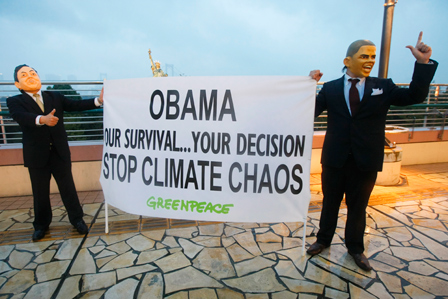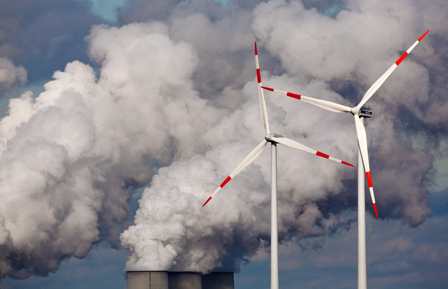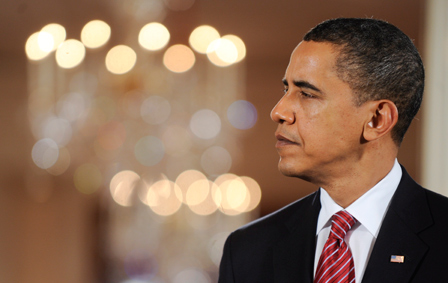Erstellt am: 4. 12. 2009 - 19:30 Uhr
The Road To Copenhagen : The USA
FM4 zum Thema Klimaschutz
- Copenhagen: Frosty Inside Frosty Outside
- Klimawandel und globale Gerechtigkeit
- People Power At Copenhagen
- Sozial gegen den Klimawandel
- Wie die Technik unser Klima retten will
- Road To Copenhagen: The USA
- Wissenschaft und Klimawandel
- Was die Streitparteien bewegt
- Der Umweltminister zu Gast bei FM4
- Ice-free Arctic Summer within 10 years?
- Das Klima ist nicht straight
- 1 Million Taten für den Klimaschutz
- Chris Cummins‘ Ausblick auf Kopenhagen
Alle Stories zum Thema findest du hier
'Cometh the hour cometh the man' goes the old proverb. But, alas, it seems that he cometh not. With December 2009 likely to go down in history as a very poised moment in mankind's relationship with the natural world, Barack Obama looks unlikely to make any meaningful gesture at the UN Copenhagen Climate Summit.
On climate issues Barack Obama has shelved his “Yes We Can” message for the rather less inspiring “Well, listen guys, it’s all rather complicated in my country.”
After delighting green campaigners by using his inaugural speech to talk about climate change, Obama has now disappointed them in equal measure by announcing he will not join the rest of the leaders of the industrialised world during the final crucial days of the Copenhagen summit.

EPA
"You First"
This is very bad news and not just because of the USA's huge carbon footprint. If Washington doesn’t appear to be taking the summit seriously then there is little motivation for China to announce the sort of dramatic carbon cuts that are thought to be needed to avoid catastrophic climate change. China might have recently overtaken the USA as the world’s largest emitter, but is sick of what it sees as the hypocrisy on the issue – the Western economies have grown rich on 200 years of carbon emissions and emit 4 or 5 times as much per capita as China. Beijing is adamant, therefore, that the US should make the first big move.
As Greenpeace’s Stephanie Turnmore, who is already at the site of the summit, puts it; “It’s crucial for the US to be involved in Copenhagen.”
All Talk?
President Bush walked away from this issue in 2001 when the US withdrew from Kyoto and it has been a struggle ever since to convince the rest of the world to move on ahead without the US. In the past year, Obama’s rhetoric has created great hope but his deeds have not followed suit. Cynics have long said that Obama is all fine words. It’s true that he has made great speeches about ridding the world of nuclear weapons while his Administration continues to refuse to sign a global ban on land mines and cluster bombs. I wonder if the dignitaries in Oslo will mention this discrepancy to Obama as he picks up his Nobel Peace Prize next week.
We should be grateful to the Nobel Committee, however, for bringing him to Scandinavia in the first place. The geographical and seasonal serendipity means that Obama will make a blink-and-you'll-miss-me stop in Copenhagen on the 9th of December on his way to Oslo. That's a full week before the talks will reach their vital stages, prompting the activists from Greenpeace to complain that "It's the right city but the wrong date. It seems that he is just not taking this issue seriously."
It goes without saying that Obama is still on the ball rhetorically. In a typically rousing and brilliantly delivered speech this autumn at the United Nations he eloquently listed the projected consequences of global climate change, including mass-migration, poverty and increasing conflict. He concluded in that 'wind of change' way of his that "the USA will no longer drag its feet on this issue".
But, according to Obama’s office, when the negotiations hit the crucial five to midnight stage in Copenhagen, the President’s feet will be elsewhere – probably dealing with more “pressing” concerns such as healthcare and record US unemployment. That's a big blow for an agreement that was originally billed as a "blueprint to save the world". What was that about dragging of feet?

dpa-Zentralbild/Z1022 Patrick Pleul
"Whining"
The expectations of Copenhagen have been so severely watered down over recent months, mostly due to backpedaling from industrialized nations that officials have now begun referring to it as a "stepping stone" and dejected activists have expressed fears of the summit turning into another "talk shop".
"The problem with this lowering of expectations" complains Turnmore, "is that they can come out of Copenhagen with a broshure with a picture of a mermaid, wave it around and call that agreement." She dismisses the US complaints about the tight time scale and legislative difficulties as "whining".
Domestic Woes
The man who swept in the White House with great promises on climate change deserves perhaps more sympathy than that.
The health reform has already taught him that in a divided nation it is much easier to make elegant speeches about change than to enforce any real change. Even as the climate science becomes more definitive, polls show that public concern in the United States about global warming has been declining. Recent statistics have shown that many Americans still need persuading that climate change is more than a just a theory.
Dr. Robert Costanza, the Gund Professor of Ecological Economics says that is partly due to dirty energy lobbyist "muddying the water" with a concerted media effort that, he says, recalls the tobacco industry's long efforts to obscure the link between smoke and lung cancer. "The American Petroleum Institute is the world's greatest producer of uncertainty" he says.
A divided public has led to a sapping of political will on the issue of carbon cuts. For America to act Obama really needs the Congress to agree to cut US emissions and so far he has not been able to fulfill that election promise.
Obama and the Democrats were quick to realize that they couldn’t frighten voters into caring about climate change with seemingly abstract warnings about things that might happen very far in the future and have been quite canny about selling climate change initiatives. Indeed, the word "climate" didn't even appear on the legislation currently stalled in the Senate - it's called the Clean Energy and Security Act. It was framed under a new move of putting the US on a more sound economic footing and creating new jobs. And that certainly does appeal to American voters.
But Obama still has to turn a great tide of public opinion. That will take time that sicentists say he doesn't have. They say there is a tiny window of opportunity for action to contain climate change. The demand for patience clashes with the demand for haste.

EPA
Action at the Stroke of a Pen
Stephanie Turnmore of Greenpeace points out that there are ways and means for the US to commit to international treaties without waiting for the end machinations and ruminations of the Senate.
The White House has already said that if it can’t get a bill through Congress, Obama could make use the regulatory powers of the Environmental Protection Agency that could in essence order carbon cuts from big polluters at the stroke of a pen. Elliot Diringerof the Pew Center on Global Climate Change says the Obama Administration has already started using such mechanisms, but he warns that "relying on those routes alone won't deliver the degree of reductions that's needed and won't do it in a terribly coherent or efficient way."
So new legislation must be the great hope. And that such legislation isn't a taboo subject in the USA is shown by the very fact that Obama incorporated the issue very prominently into his winning election campaign. Greenpeace's StepahnieTurnmore is still quietly hopeful that Obama will be there for the crucial stages of Copenhagen: “There’s a huge amount of pressure on him to come back after he has picked up his Nobel Peace Prize.”
Maybe he cometh after all?
UPDATE
After first saying he would drop in during the first week of Copenhagen - Obama now says he will come to the end of the summit - joining Nicholas Sarkozy, Angela Merkel, Gordon Brown and co. The Whitehouse says he changed his plans after seeing progress in negotiations.


